Man Dies Of Complications 4 Years After Being Bitten By Adopted Kitten
KEY POINTS
- Henrik Kriegbaum Plettner was bitten after adopting a cat and her kittens in 2018
- He underwent 15 operations and was hospitalized for a month
- Doctors eventually had to amputate the bitten finger
- He died in October, and his family is now warning everyone of the dangers of a cat bite
A bite from an innocent-looking kitten spelled doom for a Danish man who died of complications four years later.
Henrik Kriegbaum Plettner was bitten after adopting a cat and her kittens from a shelter in 2018. One of the kittens ended up biting him on his index finger as he was trying to move them.
Plettner did not think much of the bite and ignored it. A few hours after getting bitten, however, his injured finger swelled up to twice its original size, Gizmodo reported. It was then that he realized all was not well.
Plettner called a doctor but was told to wait until the following day.
Eventually, after consultations, Plettner was admitted to Denmark's Kolding hospital. There, he underwent 15 operations and was hospitalized for a month.
But his ordeal did not end there. Even four months after the procedures, his finger did not retain complete functionality. In the end, the doctors had to amputate the bitten finger.
Life became difficult for Plettner. His health declined, and he suffered from complications, including pneumonia, gout and diabetes. He also had a weakened immune system.
"The cat had bitten right into a blood vessel, and when a cat bites and pulls its tooth out, the hole closes and the bacteria spreads," Plettner's mother said, according to LADBible.
After getting trapped in the blood vessel, the pathogen reportedly transferred by the bite remained in his body and started spreading through his bloodstream.
"We knew that he was doing badly," Plettner's wife said, as per the outlet. "However, we had no idea that he was so seriously ill."
Plettner died in October this year at the age of 33. According to his family, they have now gone public with the news to spread awareness of the dangers of a cat bite.
"Go to the doctor after a bite, don't think, 'Oh, that's just a cat,'" Plettner's wife said further. "Don't take any chances."
Common pets such as cats and dogs carry many pathogens that can be transmitted to humans through a bite or scratch, including Capnocytophaga bacteria, Bartonella henselae (which causes cat scratch disease) and Pasteurella multocida, according to Gizmodo. These microbes usually cause mild infections but can turn severe for anyone, especially those with weak immune systems or underlying health conditions.
One should receive first aid right after getting bitten by a cat, according to the Cleveland Clinic. This entails washing the wound immediately with running water and soap and not scrubbing too hard. Pressure should then be applied to the wound to restrict any bleeding. Antibiotic cream should also be applied if it's available. The wound should be covered with a sterile bandage afterward. And, most importantly, the person with the bite should see a physician as soon as possible, preferably just within hours.

© Copyright IBTimes 2025. All rights reserved.




















